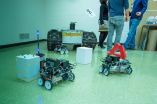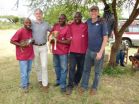(Press-News.org) Most severely obese people experience much better spirits once they shed weight through a diet, lifestyle changes or medical intervention. This is unfortunately not true for everyone, says Valentina Ivezaj and Carlos Grilo of the Yale University School of Medicine in the US. In an article in Springer's journal Obesity Surgery, the researchers advise that the levels of depression in patients be measured six to 12 months after they have had such bariatric surgery. This will ensure that the necessary help can be provided when needed.
Ivezaj and Grilo set out to investigate how prone bariatric patients are to still experiencing depressive symptoms, and especially if such symptoms increase markedly or not at all, after post-surgery. Their study is the first to examine patients with discernible worsening depressive symptoms six and 12 months following gastric bypass surgery.
Self-reported questionnaires were completed by 107 patients with extreme obesity before they underwent gastric bypass surgery, and then again six and 12 months after the procedure. They were asked to reflect on their levels of depression, possible eating disorders, their self-esteem and general social functioning. Of the 107 participants, 94 were women and 13 were men, 73 were white and 24 had completed college.
Consistent with previous research, Ivezaj and Grilo observed that most people who had undergone this procedure were in much better spirits. In fact, most patients reported experiencing a normal and improved mood at six and 12 months after surgery. However, in some cases negative mood changes started to creep in between six and 12 months after the operation, with 3.7 percent of patients reporting that they felt discernibly more depressed 12 months post-surgery. Between six and 12 months after the operation, however, even more patients (13.1 percent) reported increases in depressive symptoms. These changes went hand-in-hand with significantly lower levels of self-esteem and social functioning.
"The majority of patients whose mood had worsened discernibly experienced these mood changes between six and 12 months post-surgery, suggesting this may be a critical period for early detection and intervention, as needed," explains Ivezaj.
"The increases in symptoms of depression are also notable given that they were associated with other difficulties including lower self-esteem and social functioning," adds Grilo.
The authors note that the increases in depressive symptoms were indicative of only subthreshold or mild mood disturbances. They also indicated that future research is needed to determine whether these mood changes continue to worsen over time for this group.
INFORMATION:
Reference:
Ivezaj, V. & Grilo, C.M. (2014). When Mood Worsens after Gastric Bypass Surgery: Characterization of Bariatric Patients with Increases in Depressive Symptoms Following Surgery, Obesity Surgery DOI 10.1007/s11695-014-1402-z.
Bariatric surgery not a magic wand to curb depression
Yale researchers find that not all obese people feel better after such surgery
2014-09-25
ELSE PRESS RELEASES FROM THIS DATE:
Long-term unemployed struggle as economy improves, Rutgers study finds
2014-09-25
NEW BRUNSWICK, N.J. – While the unemployment rate for people out of work for six months or less has returned to prerecession levels, the levels of unemployment for workers who remain jobless for more than six months is among the most persistent, negative effects of the Great Recession, according to a new national study at Rutgers. In fact, one in five workers laid off from a job during the last five years are still unemployed and looking for work, researchers from the John J. Heldrich Center for Workforce Development found.
Among the key findings of "Left Behind: The ...
Blackout? Robots to the rescue
2014-09-25
Big disasters almost always result in big power failures. Not only do they take down the TV and fridge, they also wreak havoc with key infrastructure like cell towers. That can delay search and rescue operations at a time when minutes count.
Now, a team led by Nina Mahmoudian of Michigan Technological University has developed a tabletop model of a robot team that can bring power to places that need it the most.
"If we can regain power in communication towers, then we can find the people we need to rescue," says Mahmoudian, an assistant professor of mechanical engineering–engineering ...
Drivers admit to risky behaviors in RU-Eagleton, NJ Medical School public health poll
2014-09-25
NEW BRUNSWICK, N.J. – In a state famous for its turnpike and infamous for traffic, tolls and "Jersey drivers," a new partnership between the Rutgers-Eagleton Poll and Rutgers New Jersey Medical School (NJMS) has launched a series of public health polls with a survey about risky driving habits. New Jerseyans were asked about their perceptions of safety both as a driver and passenger.
"Three-quarters of New Jerseyans are behind the wheel nearly every day. They are continually at the center of jokes and have even been ranked as some of the worst drivers in the country," ...
Dunes reveal biodiversity secrets
2014-09-25
Ancient, acidic and nutrient-depleted dunes in Western Australia are not an obvious place to answer a question that has vexed tropical biologists for decades. But the Jurien Bay dunes proved to be the perfect site to unravel why plant diversity varies from place to place. Smithsonian Tropical Research Institute scientist Benjamin Turner and colleagues from the University of Western Australia published findings in the Sept. 26 edition of Science showing that environmental filtering—but not a host of other theories—determines local plant diversity in one of Earth's biodiversity ...
Tropical disease prevalence in Latin America presents opportunity for US
2014-09-25
HOUSTON – (Sept. 25, 2014) – Recently published prevalence estimates of neglected tropical diseases (NTDs) in five Latin American countries — Bolivia, Cuba, Ecuador, Nicaragua and Venezuela — could suggest a new direction for United States foreign policy in the region, according to a tropical-disease expert at Rice University's Baker Institute for Public Policy.
Dr. Peter Hotez, the fellow in disease and poverty at the Baker Institute, outlined his insights in a new editorial, "The NTDs and Vaccine Diplomacy in Latin America: Opportunities for United States Foreign Policy," ...
Stem cell transplant does not cure SHIV/AIDS after irradiation of infected rhesus macaques
2014-09-25
A study published on September 25th in PLOS Pathogens reports a new primate model to test treatments that might cure HIV/AIDS and suggests answers to questions raised by the "Berlin patient", the only human thought to have been cured so far.
Being HIV-positive and having developed leukemia, the Berlin patient underwent irradiation followed by a bone-marrow transplant from a donor with a mutation that abolishes the function of the CCR5 gene. The gene codes for a protein that facilitates HIV entry into human cells, and the mutation—in homozygous carriers who, like the donor, ...
Interstellar molecules are branching out
2014-09-25
Scientists from the Max Planck Institute for Radio Astronomy (Bonn, Germany), Cornell University (USA), and the University of Cologne (Germany) have for the first time detected a carbon-bearing molecule with a "branched" structure in interstellar space. The molecule, iso-propyl cyanide (i-C3H7CN), was discovered in a giant gas cloud called Sagittarius B2, a region of ongoing star formation close to the center of our galaxy that is a hot-spot for molecule-hunting astronomers. The branched structure of the carbon atoms within the iso-propyl cyanide molecule is unlike the ...
Stone Age site challenges old archaeological assumptions about human technology
2014-09-25
The analysis of artifacts from a 325,000-year-old site in Armenia shows that human technological innovation occurred intermittently throughout the Old World, rather than spreading from a single point of origin, as previously thought.
The study, published today in the journal Science, examines thousands of stone artifacts retrieved from Nor Geghi 1, a unique site preserved between two lava flows dated to 200,000–400,000 years ago. Layers of floodplain sediments and an ancient soil found between these lava flows contain the archaeological material. The dating of volcanic ...
Earth's water is older than the sun
2014-09-25
Washington, D.C.—Water was crucial to the rise of life on Earth and is also important to evaluating the possibility of life on other planets. Identifying the original source of Earth's water is key to understanding how life-fostering environments come into being and how likely they are to be found elsewhere. New work from a team including Carnegie's Conel Alexander found that much of our Solar System's water likely originated as ices that formed in interstellar space. Their work is published in Science.
Water is found throughout our Solar System. Not just on Earth, but ...
Agonizing rabies deaths can be stopped worldwide
2014-09-25
The deadly rabies virus--aptly shaped like a bullet-- can be eliminated among humans by stopping it point-blank among dogs, according to a team of international researchers led by the Paul G. Allen School for Global Animal Health at Washington State University.
Ridding the world of rabies is cost-effective and achievable through mass dog vaccination programs, the scientists report in a paper that appears in the Sept. 26 issue of Science magazine. What's more, they write, because infections occur as a result of interactions between animals and people, a "One Health" approach ...
LAST 30 PRESS RELEASES:
Antipathy toward snakes? Your parents likely talked you into that at an early age
Sylvester Cancer Tip Sheet for Feb. 2026
Online exposure to medical misinformation concentrated among older adults
Telehealth improves access to genetic services for adult survivors of childhood cancers
Outdated mortality benchmarks risk missing early signs of famine and delay recognizing mass starvation
Newly discovered bacterium converts carbon dioxide into chemicals using electricity
Flipping and reversing mini-proteins could improve disease treatment
Scientists reveal major hidden source of atmospheric nitrogen pollution in fragile lake basin
Biochar emerges as a powerful tool for soil carbon neutrality and climate mitigation
Tiny cell messengers show big promise for safer protein and gene delivery
AMS releases statement regarding the decision to rescind EPA’s 2009 Endangerment Finding
Parents’ alcohol and drug use influences their children’s consumption, research shows
Modular assembly of chiral nitrogen-bridged rings achieved by palladium-catalyzed diastereoselective and enantioselective cascade cyclization reactions
Promoting civic engagement
AMS Science Preview: Hurricane slowdown, school snow days
Deforestation in the Amazon raises the surface temperature by 3 °C during the dry season
Model more accurately maps the impact of frost on corn crops
How did humans develop sharp vision? Lab-grown retinas show likely answer
Sour grapes? Taste, experience of sour foods depends on individual consumer
At AAAS, professor Krystal Tsosie argues the future of science must be Indigenous-led
From the lab to the living room: Decoding Parkinson’s patients movements in the real world
Research advances in porous materials, as highlighted in the 2025 Nobel Prize in Chemistry
Sally C. Morton, executive vice president of ASU Knowledge Enterprise, presents a bold and practical framework for moving research from discovery to real-world impact
Biochemical parameters in patients with diabetic nephropathy versus individuals with diabetes alone, non-diabetic nephropathy, and healthy controls
Muscular strength and mortality in women ages 63 to 99
Adolescent and young adult requests for medication abortion through online telemedicine
Researchers want a better whiff of plant-based proteins
Pioneering a new generation of lithium battery cathode materials
A Pitt-Johnstown professor found syntax in the warbling duets of wild parrots
Cleaner solar manufacturing could cut global emissions by eight billion tonnes
[Press-News.org] Bariatric surgery not a magic wand to curb depressionYale researchers find that not all obese people feel better after such surgery



